

Free Resources. Free Resources Access the RARE blog through Sign up for the monthly newsletter at sent on the 1st of each month Prompts 7-12 second set of 6 prompts Download File First 6 reflective prompts PDF Download File.
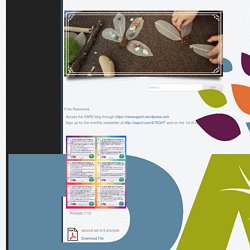
Education in New Zealand. EYLFPLP E Newsletter No26. Heather barnes presentation. VEYLDF Module 4: Assessment for Learning and Development: the Early Years Planning Cycle. Workshop materials - NQS PLP. A national program of EYLF Professional Learning Workshops were held in rural, regional and metropolitan areas from March to August 2011.
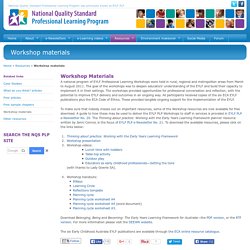
The goal of the workshops was to deepen educators’ understanding of the EYLF and build their capacity to implement it in their settings. The workshops provided opportunities for professional conversation and reflection, with the potential to improve EYLF delivery and outcomes in an ongoing way. All participants received copies of the six ECA EYLF publications plus the ECA Code of Ethics. These provided tangible ongoing support for the implementation of the EYLF. To make sure that nobody misses out on important resources, some of the Workshop resources are now available for free download. Download Belonging, Being and Becoming: The Early Years Learning Framework for Australia—the PDF version, or the RTF version. The six Early Childhood Australia EYLF publications are available through the ECA online resource catalogue. VCAA asse inecec. EYLFPLP E Newsletter No26. Unpacking the planning cycle: Part 2 – We Hear You.
During the month of September, We Hear You will be featuring a special three-part series exploring the ongoing planning cycle and documentation – ‘Unpacking the planning cycle’.
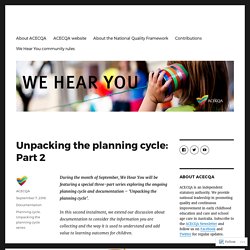
In this second instalment, we extend our discussion about documentation to consider the information you are collecting and the way it is used to understand and add value to learning outcomes for children. Unpacking the planning cycle Part 2: Gathering meaningful information, questioning and interpreting the learning In our last instalment, we looked at Why do we document? Thinking through the what and the how of the cycle of planning for children’s learning, wellbeing and development. The Guide to the National Quality Standard highlights what the National Quality Standard (NQS) aims to achieve with this Element: Educators use a variety of strategies to collect, document, organise, synthesise and interpret the information that they gather to assess children’s learning.
Eylf in action educators stories. Nqs plp e newsletter no 40 2012 summative assessment. Planning cycle – We Hear You. During the month of September, We Hear You will be featuring a special three-part series exploring the ongoing planning cycle and documentation – ‘Unpacking the planning cycle’.

In the first instalment, we consider the challenges and requirements of Quality Area 1 and Element 1.2.1 and the why, what and how of planning for children’s learning, wellbeing and development. Unpacking the planning cycle Many educators are finding Element 1.2.1 – Each child’s learning and development is assessed as part of an ongoing cycle of planning, documenting and evaluation – one of the most challenging, according to national assessment and rating data analysis. Is it because educators struggle to articulate practice and why we document? Or could it be that they are not sure about what is required in relation to Quality Area 1: Educational Program and Practice? We hear from some educators that, at times, they feel documentation is onerous and time consuming.
Unpacking the planning cycle: Part 1 – We Hear You. During the month of September, We Hear You will be featuring a special three-part series exploring the ongoing planning cycle and documentation – ‘Unpacking the planning cycle’.
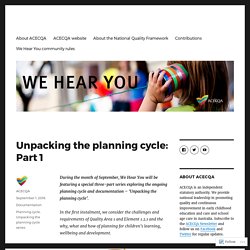
In the first instalment, we consider the challenges and requirements of Quality Area 1 and Element 1.2.1 and the why, what and how of planning for children’s learning, wellbeing and development. Unpacking the planning cycle. Samples and templates [Queensland Curriculum and Assessment Authority] Examples of practice in Prep. These Examples of practice in Prep, illustrate alignment of curriculum, pedagogy and assessment in the Prep year of schooling.
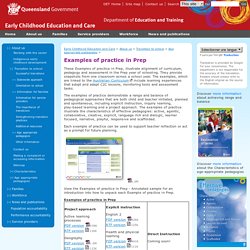
They provide snapshots from one classroom across a school year. The examples, which are linked to the Australian Curriculum include learning experiences that adopt and adapt C2C lessons, monitoring tools and assessment tasks. Achieving range and balance. Various teaching approaches may be considered age-appropriate for teaching the Australian Curriculum in the early years.
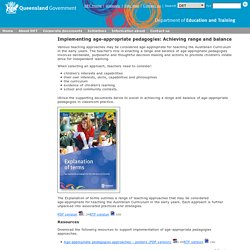
The teacher's role in enacting a range and balance of age-appropriate pedagogies involves deliberate, purposeful and thoughtful decision making and actions to promote children's innate drive for independent learning. When selecting an approach, teachers need to consider: Characteristics. INTENTIONAL TEACHING STRATEGIES. A nursery question board. Introduction I have started off in the nursery with the following activity although this could also be used with any pupils who have not yet begun philosophical training.
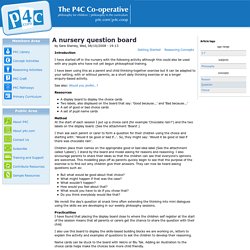
I have been using this as a parent and child thinking-together exercise but it can be adapted to your setting, with or without parents, as a short daily thinking exercise or as a longer enquiry-based activity. See also: Would you prefer...? Resources A display board to display the choice cardsTwo labels, also displayed on the board that say: 'Good because...' and 'Bad because...' Method At the start of each session I put up a choice card (for example 'Chocolate rain? ') I then ask each parent or carer to form a question for their children using the choice and starting with: 'Would it be good or bad if...'. Children place their names on the appropriate good or bad idea label (See the attachment called 'Labels'). But what would be good about that choice?
Name cards can be stuck to the board with Velcro or Blu Tak. Dr. Lilian Katz: What Should Children Be Learning? Thinking Big Extending Emergent Curriculum Projects. Department of Education and Training - Document library, Australian Government.
How to CurriculumWEB. How to series create the perfect play space f. Learning_circles_resource. Reflective Practice. Back to basics - A brief summary of early childhood observation methods and techniques. Anecdotal Observations An anecdote is a "short account of a particular incident or event of an interesting or amusing nature", often biographical ("Anecdote",nd).
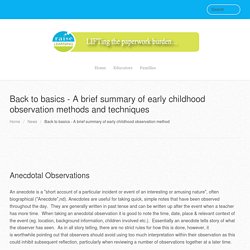
Anecdotes are useful for taking quick, simple notes that have been observed throughout the day. They are generally written in past tense and can be written up after the event when a teacher has more time. When taking an anecdotal observation it is good to note the time, date, place & relevant context of the event (eg. location, background information, children involved etc.). Essentially an anecdote tells story of what the observer has seen. What's pedagogy anyway?
NA-PLN-0001-Weekly-Plan.pdf. NEXT YC0713.pdf. Learning to Document in Reggio-inspired Education. ShareView in Chinese (PDF)HomeJournal ContentsIssue Contents Volume 13 Number 2©The Author(s) 2011 Learning to Document in Reggio-inspired EducationCarol Anne Wien York University with Victoria Guyevskey & Noula Berdoussis This article discusses how teachers in child care and elementary schools learn to work with Reggio-inspired pedagogical documentation.
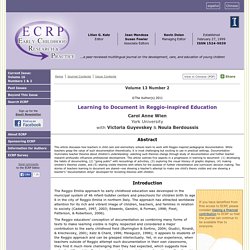
While teachers grasp the value of such documentation theoretically, it is most challenging but exciting to use in practical settings. Documentation illuminates teacher theories about children’s understanding: watching such theories change through study of documentation and further teacher research profoundly influences professional development. If you have benefited from free access to ECRP, please consider making a financial contribution to ECRP so that the journal can continue to be available free to everyone.
Documentation as Teacher Research Pedagogical documentation is the teacher’s story of the movement of children’s understanding. Ro.uow.edu.au/cgi/viewcontent.cgi?article=1350&context=edupapers. Seitz.pdf. EYLF_planning_documenting_and_assessing_childrens_learning. High_expectations_for_every_child_Di_Chandler. Earlychildhood NEWS - Article Reading Center. “Why do the children just play all day?” Asks a parent. “How do you know if they are learning?” Teachers in child-centered classrooms are often asked these questions because parents (and administrators) sometimes have difficulty discerning whether real learning can take place without teachers using worksheets and children sitting at desks.
TYC_V3N4_Reflectiveteacherexpanded.
Learning to Document in Reggio-inspired Education. Prepare to Play!: Interesting Display Ideas. I'm always looking for new ways to display my children's work and document their learning. Here is a collection of photos from around the blogs that have caught my eye recently... EMERGENT CURRICULUM: WHAT DOES IT MEAN? « "FLIGHTS OF WHIMSY" In reality, many educators profess to use an ‘emergent curriculum’ approach in their work with children, but what happens in their preschool environment can seem to be at odds with the philosophy that underpins an emergent curriculum approach.
So I would love to open this up for discussion. Please feel free to join in and help make this a lively conversation that can hopefully be of great benefit to all readers (including me!) Here is a provocation, to help promote the conversation. A piece of work completed by 5 year old Jordyn that was completely self-initiated and independently completed. A piece of work that was teacher-directed with pre-cut templates and a preconceived plan. Learning to Document in Reggio-inspired Education. Te Whāriki.
Issues. Quality_Area_1_A4. Queensland kindergarten learning guideline professional development resources. What-is-pedagogy-anyway-